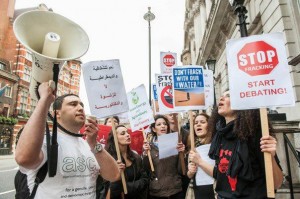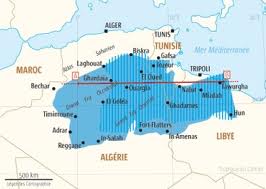The (Geo-) Politics of Energy and their Human Rights Counterpart
By Colombe Vergès, MA Student in Human Rights at the School of Advanced Study (University of London)

Sit-In of Algerian citizens in London to oppose the exploitation of shale gas without a national debate. Photo: Guy Bell
The recent amendment of the Algerian law on hydrocarbons, which came into force without public debate or consultation on 9 March 2013, has raised major concerns throughout Algeria’s civil society. Designed to respond to Algeria’s growing energy needs by fostering foreign investment in Algeria’s shale gas resources, in reality it poses serious threats to the unique ecosystem of the Sahara; creates further question marks about the perpetuation of an authoritarian system, based on a rentier economy; and offers no future to its people.
The Algerian push to persuade foreign energy companies to invest in the development of unconventional resources has not gone unnoticed in Algeria. Nor have the declarations of the French Foreign Minister, Laurent Fabius, on France’s intentions to sign an agreement allowing French companies to conduct research in the exploitation of shale gas on Algerian territory. Although President François Hollande announced a ban on hydraulic fracturing in France in September 2012, two months later Fabius confided to a few journalists that research on hydraulic fracturing would be conducted in Algeria.
‘Algeria is not an experimentation field’, claims the Algerian National Collective for Civil Liberties (CNLC). ‘The colonialism that started with nuclear tests in the Sahara can not be perpetuated with shale gas’, adds Pr. Chems Eddine Chitour, international expert and Professor at the École Polytechnique d’Alger in a debate on AlgerieDirect. To him, the exploitation of shale gas in itself is not a problem, but the current technology is not yet mature enough.
Environmental Price and the Costs of Shale Gas Extraction
 Not only does hydraulic fracturing need colossal amounts of water, explains a spokesperson of London-based Algeria Solidarity Campaign (ASC) during a conference organised in London on 6 April 2013 on ‘Shale Gas and the Future of the Next Generations in Algeria’, but also, during the fracturing process the water injected to extract the gas is mixed with a number of highly toxic chemicals, which risk contaminating the Albien, aquifer of reportedly 40,000 billion cubic meters of drinkable water contained in the Sahara and extending to Tunisia and Libya.
Not only does hydraulic fracturing need colossal amounts of water, explains a spokesperson of London-based Algeria Solidarity Campaign (ASC) during a conference organised in London on 6 April 2013 on ‘Shale Gas and the Future of the Next Generations in Algeria’, but also, during the fracturing process the water injected to extract the gas is mixed with a number of highly toxic chemicals, which risk contaminating the Albien, aquifer of reportedly 40,000 billion cubic meters of drinkable water contained in the Sahara and extending to Tunisia and Libya.
When this used water comes up to the surface, it is mixed with a number of carcinogenic and radioactive chemicals that even the best technology cannot purify 100%. All this, added to the risks of seismic activity and leaks of methane – a gas even more harmful than CO2 in terms of greenhouse emissions – make hydraulic fracturing a highly controversial technique of gas extraction.
With such a devastating impact on the environment, one may think that the technology is profitable. But according to Algerian experts, including the Vice President of the Algerian Association of the Gas Industry, former CEO of Sonatrach (the Algerian government-owned energy company) and former Minister of Water Resources, Abdelmadjid Attar, fracking is not a profitable energy yet. At 10 million dollars per well – for an approximate lifetime of four years, and with revenues down 50% by the second year, without mentioning the costs to exploit and to depollute – ‘it is not able to provide a decent return on investment’, explains Chitour; ‘unless it is heavily subsidised by the government’, a requirement that seems to have been taken into account into the new law as it was discussed in the conference organised by ASC.
So ‘why take the risk to pollute over 40,000 billion cubic meters of freshwater for an exploitation which is neither sustainable nor economically profitable?’ asks Mehdi, a journalist and member of the CNLC during the ASC Conference.
Growing Energy Needs and International Pressure
‘First of all, Algeria’s remaining reserves of gas would be around 2,000 billion cubic meters’, says Chitour. ‘We consume about 15 billion m3 (per year). And we export 70bn m3. If we keep on going like this, we will soon reach the 100bn m3 per year. So in 20 years, if we do not have a vision, if we keep the frenetic pumping, we will be out of gas.’ With Algeria’s conventional gas reserves declining and the demand for energy in the Southern Mediterranean expected to treble by 2035, it is very important that Algeria develops its energy sector, explains international oil expert and president of the Emergy Cabinet, Dr Mourad Preure, on AlgerieDirect.
Moreover, as BP is putting on hold its plans to explore gas fields due to security reasons (including in Amenas where more than 70 people died in January’s siege), Algeria is facing growing pressures from oil multinationals over the amended hydrocarbon law for not being sufficiently attractive. Indeed, although it encourages the exploitation of oil and gas with new technologies such as fracking, the amended law leaves the terms unchanged with regards to conventional resources.
Perpetuating the Status Quo
To ASC and CNLC, the strategic moves of the Algerian regime is to be read in the light of the Arab Spring and the fall of many authoritarian governments. ‘The Algerian regime is trying to buy the silence of Western governments regarding its [own] anti-democratic practices, so as not to follow the same fate as Tunisia, Egypt, Yemen or Lybia.’ Referring to the new hydrocarbon law, Mehdi explains that ‘by giving foreign companies 10 years for the exploration of shale gas and 40 years for its exploitation, the Algerian regime is looking to perpetuate its system’. Subcontracting to foreign companies allows those who share the power to live off the rent, whilst increasing Western powers’ dependency on Algeria’s energy resources ensures their silence over the human rights situation in Algeria.
In its 2012 Strategic Framework and Action Plan for Human Rights and Democracy, the European Union pledged to ‘raise human rights issues vigorously in all forms of bilateral political dialogue, including at the highest levels’. Moreover, having launched consultations with Algeria on a European Neighbourhood Policy (ENP) Action Plan in 2012, the EU is currently working with Algeria on a series of political and economic reforms.
‘Are we going to push the exploration of shale gas so it becomes like a “cash-cow” to the oil and gas lobby, or will we look at developing a sustainable alternative to existing oil and gas resources of energy?’ wonders another member of the civil society at the ASC Conference.
Alternatives to Shale Gas
One of the alternatives to the exploitation of the Saharan shale gas reserves estimated over 70 trillion cubic meters, would be to diversify Algeria’s energy mix, composed of natural gas and renewable energies (solar, wind, biomass), says Chitour. But Algeria has neither vision nor energy strategy. ‘There are lots of fields where investment is currently needed. Even in crude gas and oil we are not refining at home, so why is Algeria trying to invest in shale gas extraction instead of fully exploiting what we already have?’
To Dr Sabrina Rahmani, a member of civil society who collaborates with the CNLC, ‘we must move away from the energetic rent, and use it to get out of the energy dependence by diversifying our economy’. Instead of being used in the exploitation of shale gas, the Albien water table could indeed be used to develop the Algerian South’s agriculture and tourism industry. For instance, Algeria imports 95% of its wheat from France, why not invest in cereal agriculture?
To Frack Algeria – or Not?
All condemn the lack of strategic vision from the government. Even the former CEO of Sonatrach and Vice President of the Algerian Association for the Gas Industry, Attar recognises the regime’s need for an energy policy ‘that puts forward for instance the economy of energy as the main priority, renewable energies as a second priority, and then only should we look at those energies that are not renewable, shale gas or not’.
‘Basically, the issue should be put into a bigger debate’, concludes Chitour, ‘that of the energy policy of Algeria and the dependency on the income that derives from it, and that of its whole economic policy and the need to move away from an extractive rent-based economy which not only does not create much growth or jobs, but also creates a big environment for corruption; undermining the fabric of society and the basis of the whole democratic fabric of the Nation’.
Shale gas extraction in Algeria could have a catastrophic impact on the Sahara and its inhabitants. But at least it has opened a wider debate on the economic policy of the country. Should Algeria frack? The decision power lies in the hands of the Algerian politico-military elite and their sponsors.
It is high time the European Union upholds its standards and works with Algeria on the development of a sustainable energy policy instead of knowingly giving the means to the Algerian regime to perpetuate itself, with its diversified bouquet of human rights violations.


has this been published anywhere else?
No, this is exclusive!
Pingback: This month at the Extreme Energy Initiative | SAS blogs